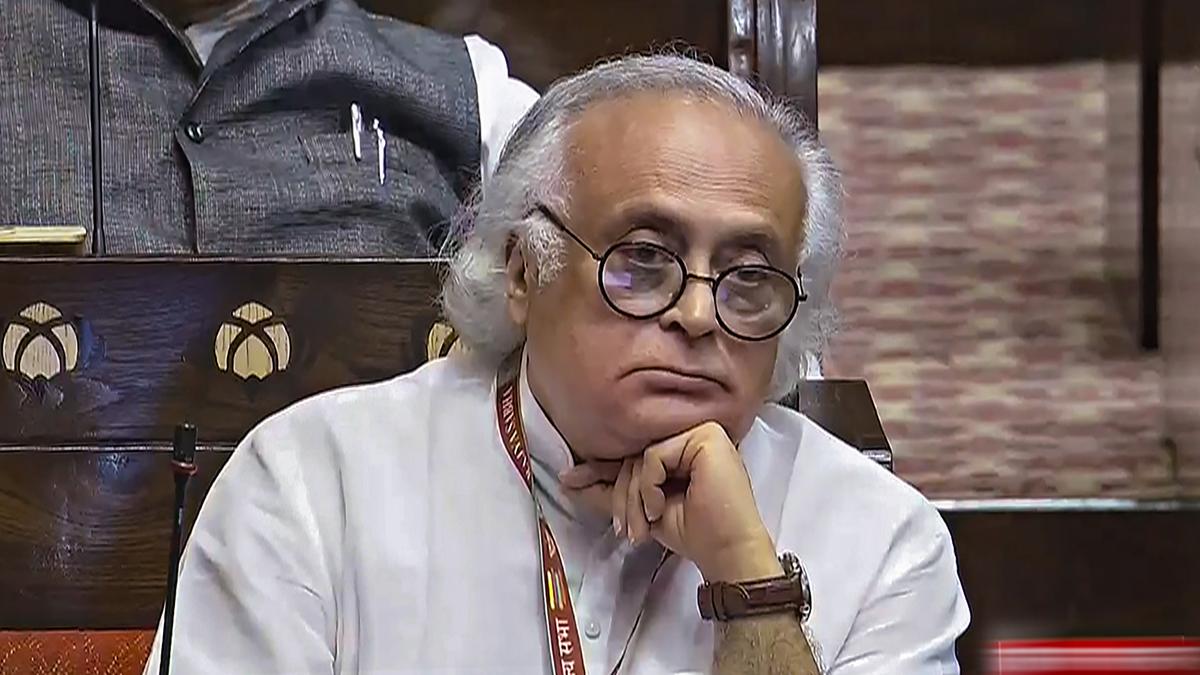Table of Contents
Ordinary households and small businesses under intense pressure, says Congress MP Jairam Ramesh

Ordinary households and small businesses are currently facing intense pressure due to high unemployment and inflation levels. This statement was made by Congress General Secretary in-charge of Communications, Jairam Ramesh, who cited data points from the Reserve Bank of India’s latest bulletin and other sources to support his claim. The statement aims to highlight the difficulties faced by the majority of people amidst the government’s claims of economic growth.
According to Mr. Ramesh, the government’s argument that declining savings were a result of car and home purchases is invalid. Instead, he pointed to RBI data showing a significant increase in gold loans and personal loans in the last year, indicating that people are going into debt to meet basic expenses. These figures indicate clear signs of distress among the population.
Mr. Ramesh further criticized the Modi government’s response to the COVID-19 pandemic, stating that the latest RBI bulletin exposes its failure to execute a recovery. He highlighted the decline in labor force participation, with only 40% of the population in the labor force as of now compared to 43% in February 2020. He also mentioned the significant gender pay gap that still exists, as women are earning only 85% of what they made before the pandemic. Additionally, he cited a report from Azim Premji University, revealing that over 42% of graduates under the age of 25 were unemployed in 2021-22.
Rise in prices
Mr. Ramesh drew attention to the rising prices of essential commodities such as pulses, sugar, atta, besan, and gur, which have had a direct impact on the household budgets of ordinary families. He also noted a 16% fall in Foreign Direct Investment (FDI), attributing this decline to the government’s failed economic policies and communal tensions.
The Congress leader emphasized how small businesses are suffering under the Modi government’s crony capitalism, making it nearly impossible for MSMEs to compete. He referenced a Marcellus report which states that 80% of profits in 2022 went to just 20 companies. Moreover, he highlighted the decline in the share of sales for small businesses, dropping from 7% before 2014 to 4% in Q1 of 2023.
Mr. Ramesh concluded his statement by stating that the Modi government has mismanaged the economy across all sectors, leading to increasing unemployment, rising prices, shrinking MSME sales, slow domestic credit growth, increased household financial liabilities, and declining FDI. He remarked that the government is too inept to resolve these issues.
Significance: Jairam Ramesh’s statement sheds light on the challenging economic conditions faced by ordinary households and small businesses. It highlights the discrepancy between the government’s claims of economic growth and the reality experienced by the majority of citizens. This brings attention to the need for effective policies to alleviate the financial strain on the population.
Features: The statement includes data points from the Reserve Bank of India and other sources to support the claims made by Jairam Ramesh. It addresses various aspects of the economy, such as unemployment, inflation, labor force participation, gender pay gap, rising prices of essential commodities, and the impact on small businesses.
Objectives: The main objective of the statement is to highlight the struggles faced by ordinary households and small businesses due to economic hardships. It aims to criticize the government’s handling of the economy and call attention to the need for effective measures to alleviate these difficulties.
Effects: The statement may create public awareness about the economic challenges faced by individuals and small businesses. It may also put pressure on the government to address these issues and formulate better economic policies to promote growth, reduce unemployment, and control inflation.
Pros:
– Draws attention to the economic hardships faced by ordinary households and small businesses
– Provides data evidence to support the claims made
– Raises awareness about the government’s alleged mismanagement of the economy
– Calls for effective measures to alleviate financial strain and promote economic growth
Cons:
– The statement may be perceived as politically motivated due to the involvement of a Congress party representative
– Critics may argue that the statement only presents a one-sided view and ignores positive aspects of the economy
– Some may question the accuracy or reliability of the data presented
Fun Fact: Did you know that India is the world’s largest consumer of gold? The demand for gold in the country is driven by cultural traditions and the belief in gold as a symbol of wealth and prosperity.
Mutiple Choice Questions
1. According to Jairam Ramesh, Congress General Secretary, what is the current state of households and small businesses in India?
a) They are flourishing and experiencing economic growth
b) They are under intense pressure due to high unemployment and inflation levels
c) They are facing no significant challenges or issues
d) They are thriving due to effective government policies
Answer: b) They are under intense pressure due to high unemployment and inflation levels
Explanation: Jairam Ramesh states in his statement that ordinary households and small businesses in India are under intense pressure due to high unemployment and inflation levels.
———————————————————————————————————————–
2. Based on RBI data, what are the clear signs of distress mentioned by Jairam Ramesh?
a) A decline in savings due to increased car and home purchases
b) A decline in personal loans and a decrease in gold loans
c) A 23% increase in gold loans and a 29% increase in personal loans
d) A decrease in debt and basic expenses
Answer: c) A 23% increase in gold loans and a 29% increase in personal loans
Explanation: Jairam Ramesh highlights RBI data which shows a 23% increase in gold loans and a 29% increase in personal loans in the last year, which he considers as clear signs of distress as people go into debt to meet basic expenses.
———————————————————————————————————————–
3. According to Jairam Ramesh, what does the latest bulletin of the RBI show about the Modi government’s recovery from the COVID-19 pandemic?
a) A successful execution of the recovery
b) A partial failure in executing the recovery
c) A complete failure in executing the recovery
d) A steady progress in executing the recovery
Answer: c) A complete failure in executing the recovery
Explanation: Jairam Ramesh states that the latest bulletin of the RBI shows the complete failure of the Modi government to execute a recovery from the COVID-19 pandemic.
———————————————————————————————————————–
4. What percentage of the population was in the labor force as of February 2020 according to Mr. Ramesh?
a) 43%
b) 40%
c) 85%
d) 42%
Answer: a) 43%
Explanation: Jairam Ramesh mentions that around 43% of the population was in the labor force as of February 2020.
———————————————————————————————————————–
5. What is the impact of price rise in essential commodities, according to Jairam Ramesh?
a) It is not affecting ordinary families’ household budgets
b) It is leading to increased savings for ordinary families
c) It is impacting the household budget of ordinary families
d) It is not a major concern for ordinary families
Answer: c) It is impacting the household budget of ordinary families
Explanation: Jairam Ramesh highlights the price rise in essential commodities such as pulses, sugar, atta, besan, and gur, and states that it is impacting the household budget of ordinary families.
———————————————————————————————————————–
6. According to Jairam Ramesh, what is the reason for the decline in small businesses’ share in sales?
a) Increased competition from large corporations
b) Decreased demand for their products or services
c) Ineffective government policies
d) Modi government’s crony capitalism
Answer: d) Modi government’s crony capitalism
Explanation: Jairam Ramesh states that small businesses are losing out because of the Modi government’s crony capitalism, which has made it “impossible for the MSMEs to compete.”
———————————————————————————————————————–
7. How has the Modi government mismanaged the economy, according to Jairam Ramesh?
a) By effectively managing all sectors
b) By increasing unemployment and household financial liabilities
c) By decreasing inflation and improving savings
d) By implementing successful economic policies
Answer: b) By increasing unemployment and household financial liabilities
Explanation: Jairam Ramesh accuses the Modi government of mismanaging the economy by increasing unemployment, rising prices of household essentials, shrinking MSME sales, slow domestic credit growth, increased household financial liabilities, and declining FDI.
Brief Summary | UPSC – IAS
Congress General Secretary Jairam Ramesh criticized the Indian government for its failure to address the economic challenges faced by ordinary households and small businesses. Ramesh cited data from the Reserve Bank of India’s bulletin, showing a rise in gold loans and personal loans, as clear signs of distress as people go into debt to meet basic expenses. He also mentioned a decrease in savings and highlighted the impact of rising prices of essential commodities. Ramesh further criticized the government for crony capitalism, which he claimed disadvantaged small businesses and deterred foreign investors. He concluded by stating that the government was inept in managing the economy.

